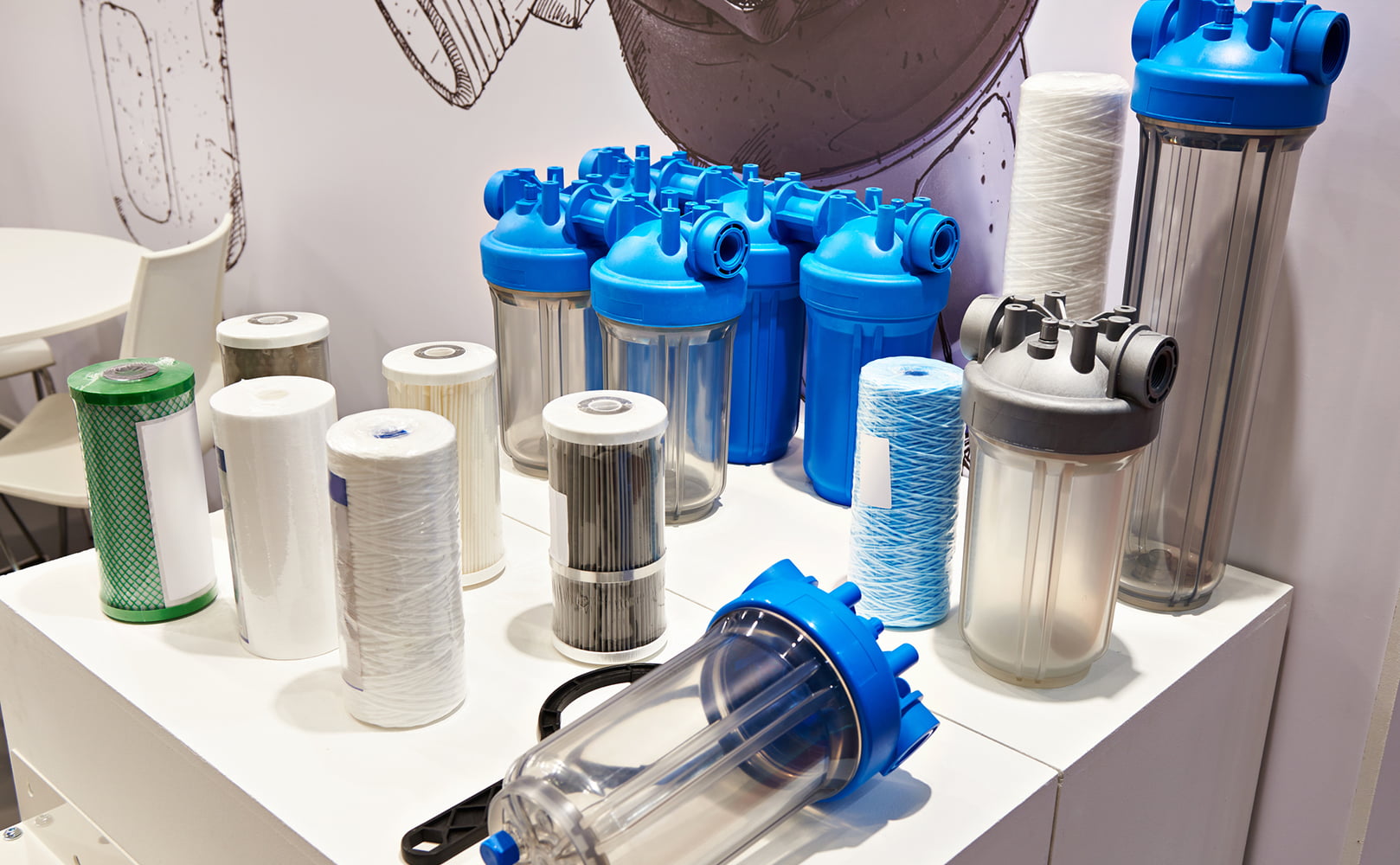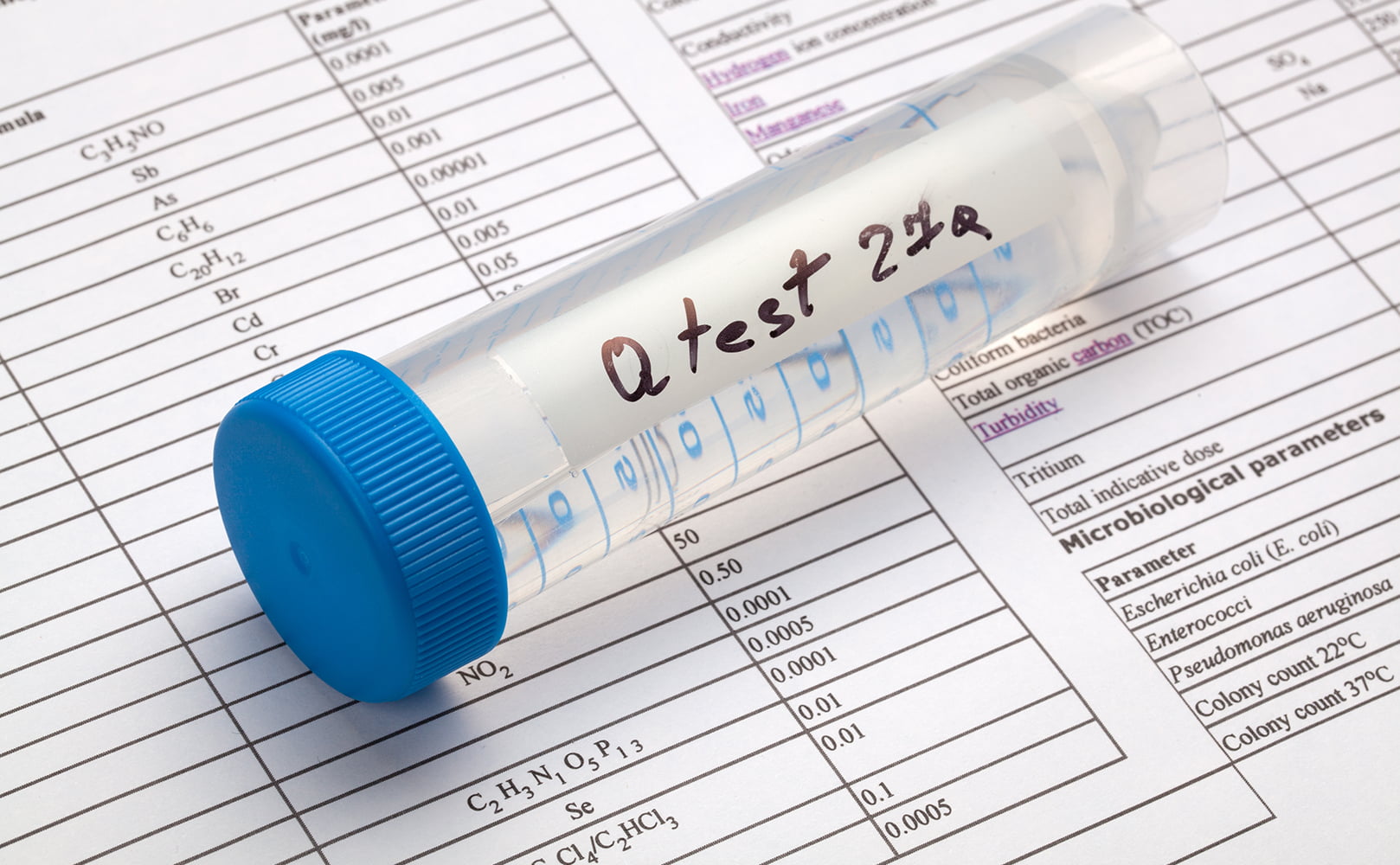How Do Well Water Filtration Systems Work?
Written by: Gene Fitzgerald // Last Updated: Aug 17, 2023
This page may contain affiliate links. If you buy a product or service through such a link we earn a commission at no extra cost to you. Learn more.
Well water comes with a unique set of problems you normally wouldn’t encounter with city water.
This means it’s crucial to choose the right well water filtration system.
In this guide, we will discuss how well water filtration systems work and explore the different types available on the market.
Key Takeaways
Most well water filtration systems work like this:
- Pre-filtration – Pre-filtration uses sediment filters to remove large particles such as sand, silt, and rust.
- Main treatment – Uses iron, carbon, and/or KDF and similar filters to remove chemicals, heavy metals, and so on.
- Post-filtration – Often uses a UV water purifier to eliminate harmful microorganisms.
What Is a Whole House Well Water Filtration System and How Does It Work?
A whole house water filter is a system that is installed on your main water line where water first enters your home. It is designed to remove different types of contaminants from your water, making it safe for drinking, cooking, and bathing.
Many manufacturers offer whole house filtration systems built specifically for well water. These often come with features not found in common whole house filters.
Below is a breakdown of how a well water filtration system works.
Pre-Filtration
In this stage, the water is filtered to remove large particles such as sand, silt, and rust. A sediment filter or multimedia filter is used for this purpose.
Sediment filters are important for well water filtration because they help remove dirt and other floating particles from your water supply.
Main Treatment
The next stage of well water filtration is the main treatment.
Here, iron removal filters are necessary for many homes with well water, because high levels of iron cannot only cause stains and discoloration, but also damage appliances.
The well water may also be passed through a carbon filter to remove pesticides and other chemicals.
Another common type is KDF systems.
Post-Filtration
After the water has been treated, it may then pass through a post-filter to remove any remaining contamination. This final stage helps to ensure that your water is clean and safe to use.
This is where we often find a UV water purifier capable of eliminating harmful microorganisms.
Different Types of Whole House Well Water Filters and What They Remove
There are different types of whole house water filters for well water according to the contaminants they treat. Here are some of the most common systems:
Sediment Filters
Sediment filters handle the most obvious well water contaminants. They are designed to remove physical debris such as dirt, sand, and rust particles.
Generally, sediment filters need to be replaced every 3 to 12 months, depending on the level of contaminants in your well.
Iron/Manganese/Sulfur Removal Systems
These systems remove dissolved iron, manganese, and sulfur from water through a process called oxidation, which converts the dissolved contaminants into solid particles that can be filtered out.
Additionally, these systems may come with a backwash feature that helps keep the filters clean and working efficiently.
Carbon-Based Filters
Carbon-based filters use activated or catalytic carbon to remove a wide range of contaminants, including chlorine, VOCs, THMs, and other chemicals. They can also remove sediment and other coarse dirt.
KDF
KDF filters are mostly used in conjunction with other types of filters. They work by removing chlorine and heavy metals from water using a process called redox (oxidation-reduction).
KDF filters can also control bacteria and other pathogenic pollutants.
UV Systems
Ultraviolet (UV) systems are effective in treating bacteria, viruses, and protozoa. UV light disrupts the DNA of microorganisms, making them unable to reproduce. As a result, they die off.
However, UV systems don’t remove any other contaminants such as dissolved salts and heavy metals.
(Water Softeners)
In many cases, well water becomes hard water because of the high concentration of minerals dissolved in it. Hard water isn’t necessarily unhealthy, but it can cause problems around the house. It can make soap less effective, lead to limescale buildup in appliances and plumbing fixtures, and cause dry skin and hair.
To avoid these issues, you may choose to invest in a water softener. These devices work by exchanging the hard minerals in well water for softer ones using a process called ion exchange.
Do You Even Need a Well Water Filtration System?
Well water is more susceptible to contamination since it comes from the ground and, unlike city water, is not treated with chemicals. You will need to consider environmental threats like rainwater, bacteria, organism decay, and others.
The Environmental Protection Agency doesn’t regulate private wells, so it’s your responsibility to make sure your water is safe. Some homeowners believe they can assess the safety of their well water just by looking at it. However, the reality is that it’s tough to know if you need a water filtration system without a proper water test.
Testing Your Well Water for Common Issues
You can have your well water tested by a state-certified laboratory or hire a company that specializes in water testing. A comprehensive water test includes testing for physical, chemical, and biological contaminants.
The most common water tests screen for bacteria, E. coli, and fecal coliform. If any of these bacteria are present in your well water, you need to take immediate action as they can cause serious health problems.
Other tests check for nitrates, lead, copper, and other metals. These can also be harmful, especially to infants and young children.
You should also have your water tested for hardness, iron, and pH levels. Water with a high level of hardness is difficult to clean and can cause problems like dry skin and scalp.
Too much iron in your water can lead to rust-colored stains on your clothes and plumbing fixtures. Water with a low pH level is acidic and can corrode pipes over time. It can also give your water a metallic taste.
How Often to Test
While it is typically recommended to test your well water once a year, there are many scenarios where you would need to test more frequently.
The EPA recommends immediate testing when these situations arise:
- If you notice any changes in your water quality
- There are known problems with water in your area
- After environmental occurrences like flooding and land disturbances
- After repairing or replacing well components or pipes
- When there are industrial or construction activities near your area
How to Choose the Ideal Well Water Filter
There are several things to consider when choosing the right water filter for your well. Before shopping, keep these factors in mind.
1. Contaminants in Your Well Water
Before anything else, have your water tested. Because once you know what’s in your water, it will be easier to find the right filtration system that can remove those specific contaminants.
For example, if your well water has a large concentration of sediment and bacteria, you may want to check out systems with sediment and UV filters.
2. Water Flow Rate
Your well’s flow rate will also dictate the size of the filtration system you need. A low flow rate means a smaller and less expensive unit, while a high flow rate will require a larger and pricier system.
To help determine this, you need to understand how your well pump works. Aside from the amount of water usage in your home, the size of the well pump also affects the flow rate.
3. Maintenance Requirements
Some filtration systems are easier to look after than others. Consider how often you’re willing to clean or replace filters before making a purchase.
Another consideration is the cost of replacement filters.
4. Warranties and Customer Support
Last but not least, don’t forget to check the warranties and customer support offered by the manufacturer. A good company should offer at least a one-year warranty on all parts.
They should also have a responsive customer support team that you can easily reach in case you have questions or problems with your system.
Is Well Water Dangerous or Safe?
Groundwater is thought to be typically safe, since the soil acts as a natural filter. But many other issues can contaminate your well water, like improper construction or old components.
Because the EPA doesn’t regulate well water, the responsibility of keeping it safe is yours. As long as you properly address the issues and practice regular maintenance, your well water will be safe to use.
If you have any questions about how well water filtration systems work please don’t hesitate to leave a comment below!
Information provided on BOS is for educational purposes only. The products and services we review may not be right for your individual circumstances.
We adhere to strict editorial guidelines. Rest assured, the opinions expressed have not been provided, reviewed, or otherwise endorsed by our partners – they are unbiased, independent, and the author’s alone. Our licensed experts fact-check all content for accuracy. It is accurate as of the date posted and to the best of our knowledge.



